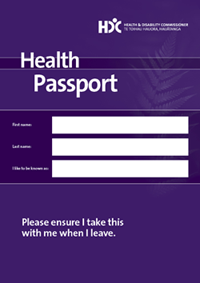Health Passport
- The Health Passport is a booklet completed for people with communication difficulties

- It contains information that staff may need to know about them to provide the best care and support the needs of that person
Key points
- The Health Passport is not a medical record
- The patient, family or caregiver completes the Passport
- It may contain as much or as little information as the patient wants to share
- The Health Passport stays with the patient at all times
- It needs to be accessible to anyone who works with the patient
- It goes home with the patient
FAQs
- The Passport belongs to the patient, is kept and updated by him or her, and comes with the patient to hospital
- Copies can be made for DHB records, but the original Passport goes home with the patient
- The Health Passport was originally developed for people with intellectual disabilities, but can be used by anyone who may benefit from a communication tool
- This includes people who use English as a second language, older adults and people with disabilities, but may be used by anyone who wants to use it
- The person, a member of their family or their caregiver, complete the bits of the Health Passport that they want staff to know about
- People only need to complete the information that is relevant to them
- Some Health Passports may have very little information in them, while others will be full of information
- It is up to the patient
- This is a patient owned communication tool
- It should be visible and easily accessible to all staff and should be with the patient at all times
- The aim is to make it easy to use in all New Zealand hospitals
- As people move between hospitals, the Health Passport will remain the same, making communication easier for both staff and patients
- The risk of the medication being incorrect and/or different to the patient’s medical record was considered high
- It was decided not to include lists of medication in the Health Passport
- At the hospital reception areas
- In the Emergency Department
- At some GP surgeries
- Disability service providers in the community
- Download from Health and Disability Commission
- If you have any comments about using the Health Passport, either as staff or as a consumer, please feedback to:






